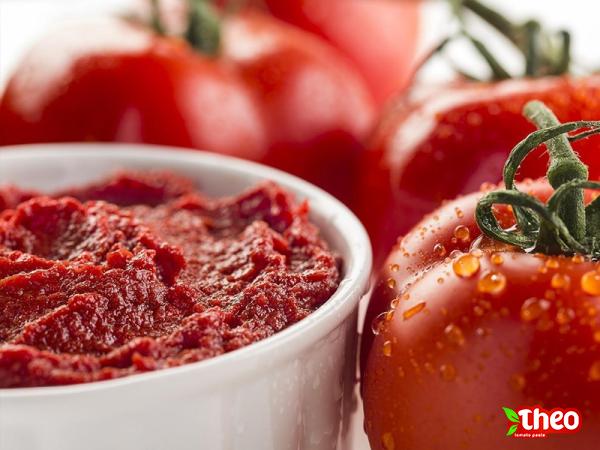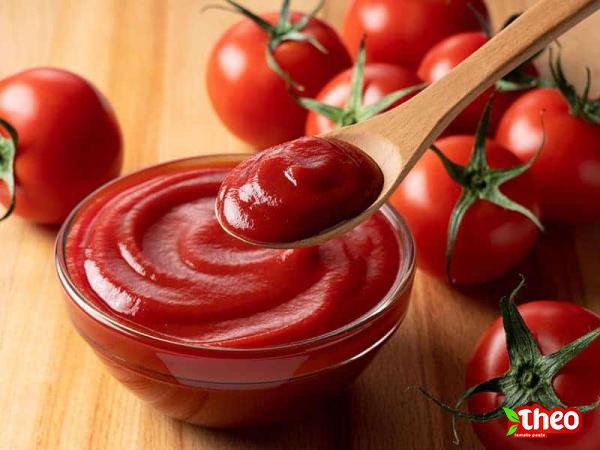A Comprehensive Summary Introduction: Tomato paste is a highly concentrated culinary ingredient created by cooking ripe tomatoes for an extended period, resulting in a thick and rich product. Typically, tomato paste is made from tomatoes that have been peeled, deseeded, and strained to remove excess water. The thick consistency of tomato paste serves various purposes in the culinary world, making it a vital ingredient in numerous recipes worldwide. In this summary, we will delve into the uses, benefits, production process, and storage of tomato paste thick. Uses of Tomato Paste Thick: 1. Flavor Enhancer: Tomato paste thick is well-known for its ability to intensify the taste of various dishes, including stews, soups, pasta sauces, curries, and casseroles. Its concentrated flavor adds depth and richness even in small quantities. 2. Base Ingredient: Tomato paste thick serves as a fundamental component in many recipes, often forming the base of sauces, gravies, and marinades. Its paste-like consistency makes it easy to blend with other ingredients, distributing its flavor throughout the dish. 3. Color Enhancer: Tomato paste thick lends a vibrant red color to many dishes, enhancing their visual appeal. It can be used to intensify the hue of sauces, gravies, and even bread dough. 4. Pizza and Pasta Sauce: Tomato paste thick is commonly used as a base for homemade pizza and pasta sauces. Its intense flavor and thickness contribute to the rich taste and texture of these classic Italian dishes. 5. Dipping Sauce: Mixed with herbs, spices, and other ingredients, tomato paste thick can be transformed into a delicious dipping sauce for finger foods like chicken nuggets, fries, and breadsticks. Benefits of Tomato Paste Thick: 1. Nutritional Content: Tomato paste thick contains a range of essential nutrients such as vitamins A, C, and K, as well as cancer-fighting antioxidants like lycopene. However, it is worth noting that the concentration of these nutrients can vary based on the brand and production methods. 2. Long Shelf Life: The thick consistency of tomato paste contributes to its extended shelf life, allowing it to be stored for long periods without spoilage. This is due to the reduced moisture content, making it less prone to bacterial growth. 3. Convenient Cooking: Tomato paste thick is an excellent time-saver in the kitchen as it provides a rich and concentrated flavor without requiring the lengthy cooking time associated with reducing fresh tomatoes.
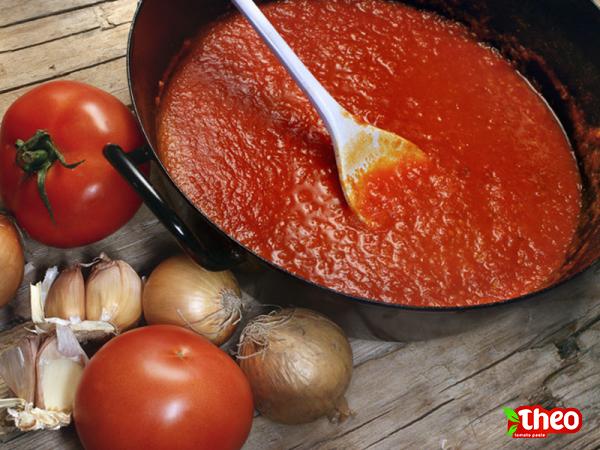
tomato paste
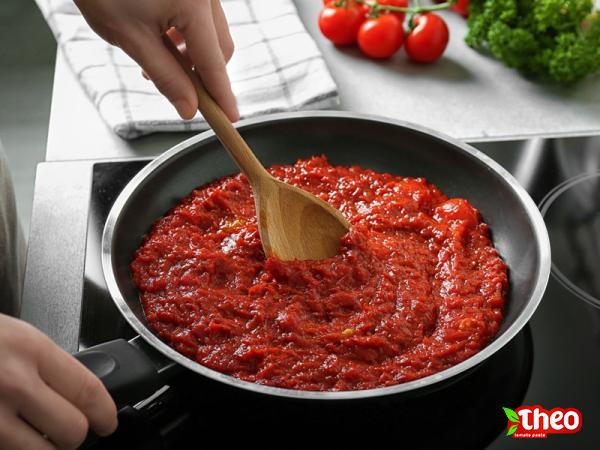 Production Process of Tomato Paste Thick: 1. Tomato Selection: Ripe, plump, and high-quality tomatoes are chosen for the production of tomato paste thick. The selection process ensures that only the best tomatoes are used to achieve the desired flavor and texture. 2. Blanching and Straining: The selected tomatoes are blanched in hot water to loosen the skin, making it easier to peel. After peeling, the tomatoes are deseeded to remove excess water and unwanted components. The deseeded tomatoes are then strained to achieve a smooth consistency. 3. Cooking and Reduction: The strained tomatoes are then cooked at a low heat for an extended period, typically several hours. This slow cooking process allows for the evaporation of excess water, resulting in a thickened paste-like consistency. 4. Packaging: Once the desired thickness is achieved, the tomato paste is carefully packaged into cans, tubes, or jars for sale in the market. Proper packaging ensures the preservation of flavor and extends its shelf life. Storage of Tomato Paste Thick: 1. Refrigeration: Once opened, tomato paste thick should be stored in an airtight container in the refrigerator. It can typically last for up to ten days in the refrigerator. 2. Freezing: For long-term storage, tomato paste thick can be frozen in small portions using ice cube trays or freezer-safe containers. Properly frozen tomato paste can last for several months. 3. Canning: Tomato paste thick can also be preserved through canning methods. This involves transferring the paste into sterilized glass jars and processing them in a hot water bath to create a vacuum seal, ensuring long-term preservation. Conclusion: Tomato paste thick is a versatile ingredient that adds depth, flavor, and color to various dishes. Its concentrated nature and extended shelf life make it a staple in many kitchens around the world. Whether used as a base ingredient or a flavor enhancer, tomato paste thick offers convenience and culinary creativity in numerous recipes. With its nutritional benefits and countless applications, tomato paste thick deserves its place as a pantry essential.Title: Tomato Paste Thick: A Versatile Ingredient in the Food Industry
Production Process of Tomato Paste Thick: 1. Tomato Selection: Ripe, plump, and high-quality tomatoes are chosen for the production of tomato paste thick. The selection process ensures that only the best tomatoes are used to achieve the desired flavor and texture. 2. Blanching and Straining: The selected tomatoes are blanched in hot water to loosen the skin, making it easier to peel. After peeling, the tomatoes are deseeded to remove excess water and unwanted components. The deseeded tomatoes are then strained to achieve a smooth consistency. 3. Cooking and Reduction: The strained tomatoes are then cooked at a low heat for an extended period, typically several hours. This slow cooking process allows for the evaporation of excess water, resulting in a thickened paste-like consistency. 4. Packaging: Once the desired thickness is achieved, the tomato paste is carefully packaged into cans, tubes, or jars for sale in the market. Proper packaging ensures the preservation of flavor and extends its shelf life. Storage of Tomato Paste Thick: 1. Refrigeration: Once opened, tomato paste thick should be stored in an airtight container in the refrigerator. It can typically last for up to ten days in the refrigerator. 2. Freezing: For long-term storage, tomato paste thick can be frozen in small portions using ice cube trays or freezer-safe containers. Properly frozen tomato paste can last for several months. 3. Canning: Tomato paste thick can also be preserved through canning methods. This involves transferring the paste into sterilized glass jars and processing them in a hot water bath to create a vacuum seal, ensuring long-term preservation. Conclusion: Tomato paste thick is a versatile ingredient that adds depth, flavor, and color to various dishes. Its concentrated nature and extended shelf life make it a staple in many kitchens around the world. Whether used as a base ingredient or a flavor enhancer, tomato paste thick offers convenience and culinary creativity in numerous recipes. With its nutritional benefits and countless applications, tomato paste thick deserves its place as a pantry essential.Title: Tomato Paste Thick: A Versatile Ingredient in the Food Industry
Specifications of tomato paste
 Introduction: In the previous section, we explored the uses, benefits, production process, and storage of tomato paste thick. In this continuation, we will delve into the business aspects of tomato paste thick, examining its market demand, potential for innovation, key players, and emerging trends in the food industry. 1. Market Demand for Tomato Paste Thick: Tomato paste thick is a highly sought-after ingredient in the food industry globally. Its versatility and ability to enhance the flavor and color of various dishes make it an essential product in both commercial and home kitchens. The rising popularity of global cuisines, such as Italian, Mexican, and Mediterranean, has further increased the demand for tomato paste thick in the foodservice sector, including restaurants, cafes, and catering businesses. 2. Key Players in the Tomato Paste Thick Industry: Numerous companies dominate the tomato paste thick market, supplying foodservice providers, supermarkets, and wholesalers with their products. Some well-known names in the industry include: a) Mutti: An Italian company known for producing high-quality tomato products, including tomato paste thick. With a long-standing history and strong brand recognition, Mutti is a market leader in many countries. b) Hunt’s: A popular brand in North America, Hunt’s offers a range of tomato products, including tomato paste thick. Its brand loyalty and wide distribution network have contributed to its success. c) Heinz: A global food company, Heinz produces tomato paste thick under its renowned brand. The company’s commitment to quality and innovation has made it a significant player in the industry. 3. Innovation in Tomato Paste Thick: To stay competitive in the market, companies are focusing on product innovation to meet evolving consumer preferences and dietary requirements. Some notable innovations in the tomato paste thick industry include: a) Organic and Non-GMO Varieties: With the growing demand for organic and non-GMO products, companies are developing tomato paste thick made from organically grown tomatoes, ensuring a cleaner and healthier product.
Introduction: In the previous section, we explored the uses, benefits, production process, and storage of tomato paste thick. In this continuation, we will delve into the business aspects of tomato paste thick, examining its market demand, potential for innovation, key players, and emerging trends in the food industry. 1. Market Demand for Tomato Paste Thick: Tomato paste thick is a highly sought-after ingredient in the food industry globally. Its versatility and ability to enhance the flavor and color of various dishes make it an essential product in both commercial and home kitchens. The rising popularity of global cuisines, such as Italian, Mexican, and Mediterranean, has further increased the demand for tomato paste thick in the foodservice sector, including restaurants, cafes, and catering businesses. 2. Key Players in the Tomato Paste Thick Industry: Numerous companies dominate the tomato paste thick market, supplying foodservice providers, supermarkets, and wholesalers with their products. Some well-known names in the industry include: a) Mutti: An Italian company known for producing high-quality tomato products, including tomato paste thick. With a long-standing history and strong brand recognition, Mutti is a market leader in many countries. b) Hunt’s: A popular brand in North America, Hunt’s offers a range of tomato products, including tomato paste thick. Its brand loyalty and wide distribution network have contributed to its success. c) Heinz: A global food company, Heinz produces tomato paste thick under its renowned brand. The company’s commitment to quality and innovation has made it a significant player in the industry. 3. Innovation in Tomato Paste Thick: To stay competitive in the market, companies are focusing on product innovation to meet evolving consumer preferences and dietary requirements. Some notable innovations in the tomato paste thick industry include: a) Organic and Non-GMO Varieties: With the growing demand for organic and non-GMO products, companies are developing tomato paste thick made from organically grown tomatoes, ensuring a cleaner and healthier product.
buy tomato paste
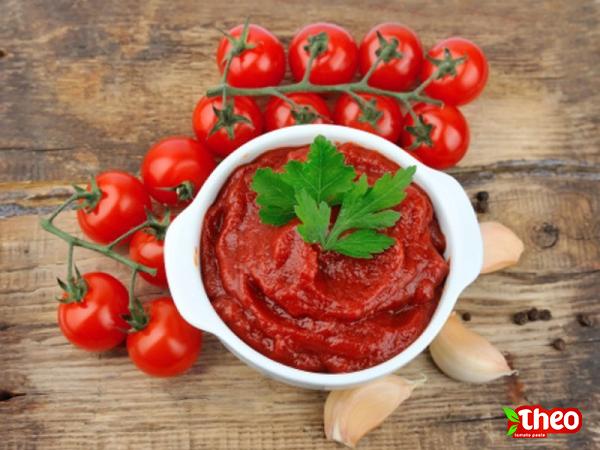 b) Low-Sodium Options: To cater to health-conscious consumers, some manufacturers have introduced low-sodium variants of tomato paste thick. These options retain the flavor while addressing concerns related to sodium intake. c) Flavor Infusions: Companies are exploring the addition of herbs, spices, and other natural flavors to create infused varieties of tomato paste thick. This innovation provides consumers with a convenient way to enhance the taste of their dishes. 4. Emerging Trends in Tomato Paste Thick: The tomato paste thick industry is subject to various trends that influence consumer preferences and market dynamics. Some emerging trends in the industry include: a) Plant-Based Diets: The growing popularity of plant-based diets has fueled the demand for tomato paste thick as a key ingredient in vegan and vegetarian recipes. This trend opens up new opportunities for manufacturers to cater to a wider audience. b) Clean Label Products: Consumers are increasingly seeking food products with transparent ingredient lists and minimal additives. Tomato paste thick manufacturers are responding by offering clean label options, ensuring that their products align with consumer expectations. c) Sustainable Packaging: There is a growing emphasis on sustainable packaging in the food industry. Tomato paste thick manufacturers are exploring eco-friendly alternatives such as recyclable and biodegradable packaging materials to minimize their environmental footprint. 5. Supply Chain Challenges: The production and distribution of tomato paste thick face several supply chain challenges that can impact the availability and pricing of the product. These challenges include: a) Seasonal Demand: Tomatoes, the primary raw material for tomato paste thick, are seasonally harvested. As a result, manufacturers must carefully manage their supply chains to ensure a consistent and uninterrupted supply of tomatoes throughout the year. b) Transportation and Storage: Tomato paste thick is a perishable product that requires proper temperature control during transportation and storage. Maintaining the cold chain is crucial to preserve the quality and extend the shelf life of the product. c) Price Volatility: Fluctuations in tomato prices can impact the cost of production and ultimately affect the pricing of tomato paste thick. Manufacturers must closely monitor market trends and adjust their pricing strategies accordingly. 6. Global Market Expansion: The demand for tomato paste thick is not limited to specific regions. The product has a significant presence in various global markets, including North America, Europe, Asia-Pacific, and the Middle East. As the popularity of international cuisines continues to rise, the global market for tomato paste thick is expected to expand further. Conclusion: Tomato paste thick is a versatile and highly demanded ingredient in the food industry. With its ability to enhance flavor, color, and texture, tomato paste thick finds application in a wide range of dishes worldwide. As companies strive for innovation, cater to emerging consumer trends, and address supply chain challenges, the tomato paste thick market is poised for growth and further expansion. Capturing the market opportunities and meeting evolving consumer demands will be key to success for industry players in the highly competitive tomato paste thick industry.
b) Low-Sodium Options: To cater to health-conscious consumers, some manufacturers have introduced low-sodium variants of tomato paste thick. These options retain the flavor while addressing concerns related to sodium intake. c) Flavor Infusions: Companies are exploring the addition of herbs, spices, and other natural flavors to create infused varieties of tomato paste thick. This innovation provides consumers with a convenient way to enhance the taste of their dishes. 4. Emerging Trends in Tomato Paste Thick: The tomato paste thick industry is subject to various trends that influence consumer preferences and market dynamics. Some emerging trends in the industry include: a) Plant-Based Diets: The growing popularity of plant-based diets has fueled the demand for tomato paste thick as a key ingredient in vegan and vegetarian recipes. This trend opens up new opportunities for manufacturers to cater to a wider audience. b) Clean Label Products: Consumers are increasingly seeking food products with transparent ingredient lists and minimal additives. Tomato paste thick manufacturers are responding by offering clean label options, ensuring that their products align with consumer expectations. c) Sustainable Packaging: There is a growing emphasis on sustainable packaging in the food industry. Tomato paste thick manufacturers are exploring eco-friendly alternatives such as recyclable and biodegradable packaging materials to minimize their environmental footprint. 5. Supply Chain Challenges: The production and distribution of tomato paste thick face several supply chain challenges that can impact the availability and pricing of the product. These challenges include: a) Seasonal Demand: Tomatoes, the primary raw material for tomato paste thick, are seasonally harvested. As a result, manufacturers must carefully manage their supply chains to ensure a consistent and uninterrupted supply of tomatoes throughout the year. b) Transportation and Storage: Tomato paste thick is a perishable product that requires proper temperature control during transportation and storage. Maintaining the cold chain is crucial to preserve the quality and extend the shelf life of the product. c) Price Volatility: Fluctuations in tomato prices can impact the cost of production and ultimately affect the pricing of tomato paste thick. Manufacturers must closely monitor market trends and adjust their pricing strategies accordingly. 6. Global Market Expansion: The demand for tomato paste thick is not limited to specific regions. The product has a significant presence in various global markets, including North America, Europe, Asia-Pacific, and the Middle East. As the popularity of international cuisines continues to rise, the global market for tomato paste thick is expected to expand further. Conclusion: Tomato paste thick is a versatile and highly demanded ingredient in the food industry. With its ability to enhance flavor, color, and texture, tomato paste thick finds application in a wide range of dishes worldwide. As companies strive for innovation, cater to emerging consumer trends, and address supply chain challenges, the tomato paste thick market is poised for growth and further expansion. Capturing the market opportunities and meeting evolving consumer demands will be key to success for industry players in the highly competitive tomato paste thick industry.

